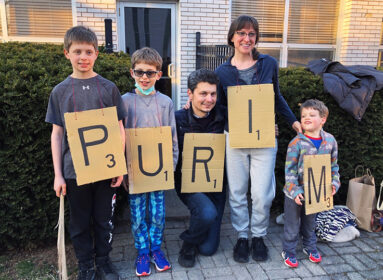By Asher Kinyon
 I am a firm believer that the influence of parents on their children largely dictates their religious beliefs and participation in that religion’s programming, traditions, and activities. Of course, there are exceptions; kids who just don’t agree with their parents’ teachings. Despite that inevitability, a large portion of kids, Jewish or otherwise, harvest a lot of their opinions, desires, interests, and beliefs from those who raise them. As influential as parents are, however, their guidance must be supplemented with Jewish programs and education that provide a positive experience, as if to validate the desires of their parents. Kids have to feel connected to their Jewish experience on two levels: 1) satisfying their parents’ wishes, and 2) genuinely enjoying some aspect of it.
I am a firm believer that the influence of parents on their children largely dictates their religious beliefs and participation in that religion’s programming, traditions, and activities. Of course, there are exceptions; kids who just don’t agree with their parents’ teachings. Despite that inevitability, a large portion of kids, Jewish or otherwise, harvest a lot of their opinions, desires, interests, and beliefs from those who raise them. As influential as parents are, however, their guidance must be supplemented with Jewish programs and education that provide a positive experience, as if to validate the desires of their parents. Kids have to feel connected to their Jewish experience on two levels: 1) satisfying their parents’ wishes, and 2) genuinely enjoying some aspect of it.
Growing up, I experienced how both of these elements were important for my peers and me. As a child, I took part in various Jewish groups purely for social and recreational purposes. These programs came in the form of after-school events at my Solomon Schechter day school, and Kadima, my synagogue’s “junior” USY organization. As I grew older, more educational programs were introduced, not in lieu of the social ones, but alongside them. Participating in these programs was presented to me as inevitable – a rite of passage, almost. So, I did not feel as though I was a victim of a bait-and-switch by the elders of my Jewish community. I had this same feeling when I joined BBYO, which contained both social and educational aspects, and presented the opportunity to assume a leadership role.
The approach of feeding teens into a system that includes both a social and educational core is very appealing, especially when an entire group is attracted, instead of individual teens (teens like to be with their friends; strangers make them uncomfortable). After they realize that they enjoy the recreational and cultural aspects of Judaism, they will be more willing to accept education as part of their routine. This is not to say that they will embrace a classroom environment for hours. That is something that I, admittedly, did not care for either. They will, however, be more receptive to methods of education that transcend the classroom, such as motivational speakers or more active, upbeat services, such as Havdallah. I really enjoyed my BBYO Havdallah services because our traditions made them raucous and exciting.
The most common excuses for a teen uninterested in Jewish education is that they could be “hanging with friends” or playing sports or partying during that period of time. The only way to mitigate that perspective is to provide those possibilities within the program. That is where BBYO really succeeds. The hope is that after being coerced, so to speak, into education through the attractiveness of social events, teens will develop an interest in the topics of study. At the end of the day, however, the onus to embrace Judaism lies with the teens themselves. The role of the facilitator is to provide them with the tools necessary to develop that interest.
Asher Kinyon grew up in Avon, where his family still lives. He is currently a first-year student at the Leonard N. Stern School of Business at New York University. He is also a graduate of JTeen Connect (formerly known as Yachad) at Beth El Temple in West Hartford. Kinyon was one of six recent high school graduates who participated on the research advisory committee for the Jim Joseph Foundation’s new report, “Effective Strategies for Educating and Engaging Jewish Teens.”
Readers are invited to submit original work on a topic of their choosing to KOLOT. Submissions should be sent to judiej@jewishledger.com.







 Southern New England Jewish Ledger
Southern New England Jewish Ledger














